Wow your customers with ingenious and useful personalisation
As 21st-century marketers, part of our job is to always wonder: What do I need to do to create compelling and engaging experiences for customers and clients, with our company? It requires an ever circumspect awareness to know what will not only satisfy customer expectations but “wow” them along your sales funnel.
That answer to that question is changing all the time, particularly with the rapid advancement of technology. One such critical trend to practice and be aware of is customer-centricity, and personalization. Loosely speaking, customer centricity is the principle, and personalization is how you put it into action with your company’s digital presence and relationship to your customers.
In the age of data saturation, we as consumers want our experiences online to be relevant, to be adapted and shaped around our interests. Every major development in how we use the internet, from search engines to social media, has to do with having our data sorted for us, intelligently. If it’s possible to achieve this on your company’s website, why choose anything else? One size never truly fits all, and customer expectations are shifting more than ever to having a digital experience tailored and adapted to our data footprint. This emerging trend is loosely called personalization.
Knowing this, the question becomes: How much personalization is necessary just to satisfy, and how much can set you apart from your competitors? Can we afford this wow factor?
While we’re all familiar with how major players like Amazon and Netflix benefit from using personalization in the form of content or product recommendations, you may be surprised by how much more this invaluable marketing tool is capable of, and how accessible and affordable it has become to SMB, thanks to scalable SaaS personalization solutions. With dynamic website personalization, it’s possible to adapt your entire website to individual customers, and segments.
The relevance and benefits of this strategy have been proven with market research:
- 52% of marketers see personalization as essential
- 72% of customers are frustrated by irrelevant content
- Conversion rates rise by an average of 20% with personalization.
That’s an extra 1/5th of current revenue waiting for your personalized website to take in, and that’s just an average; when applied skillfully, it could be more. All the signs are clear: recommendations are the new norm, and dynamic website personalization is the cutting edge in customer-centric digital marketing; when applied skillfully, it all but guarantees a boost in revenue, as well as other key factors like customer loyalty.
Here are some examples of the completely adaptive, customer-centric user experiences your company can create with the power of dynamic website personalization.
A Patriotic Holiday
Worldwide Travel is incorporating personalization into their core marketing strategy, with a heavy focus on quality recommendations in different forms on their page. While relevant recommendations are guaranteed to improve their conversion, WWT also wants to go the extra mile to create a uniquely personalized experience for every visitor, beyond recommendations alone. To do this, they utilize a comprehensive and affordable SaaS personalization solution, which is able to provide a tailored sales funnel from landing to checkout on their website.
Fred is:
- A returning customer
- A budget traveler
- Looking for family vacations
- Looking for Fourth of July vacations, interested in domestic and patriotic
Without personalization, Fred sees a page filled with irrelevant promotions and recommendations:
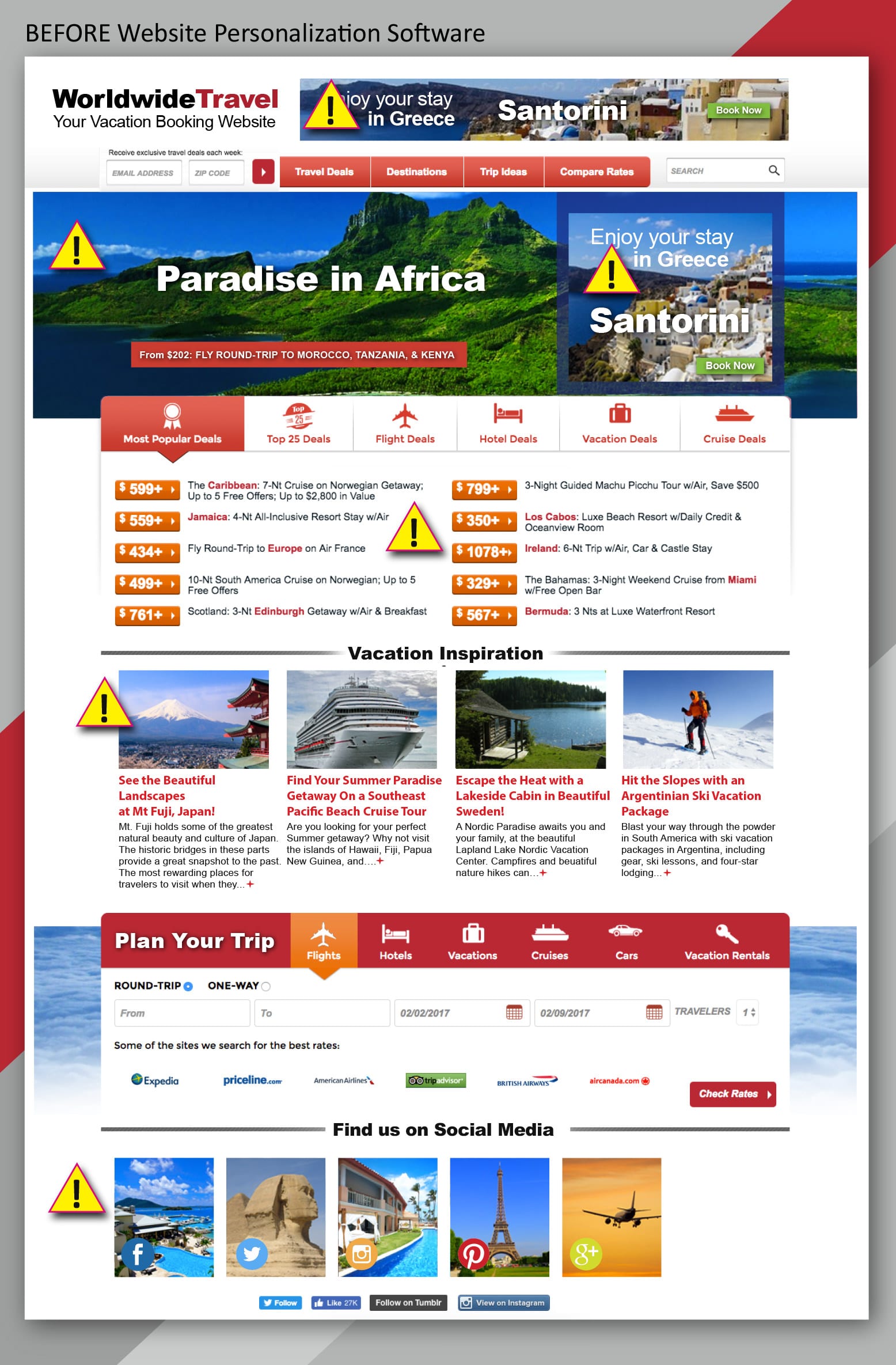
With the power of personalization, Fred’s experience on Worldwide Travel can be completely transformed. How?
From previous interactions with the site, the personalization engine knows Fred is interested in domestic vacations, his preference for family vacations, and that he is typically bargain shopper. Additionally, it knows that he has already shopped for 4th of July trips once, before.
Because he has searched for trips on the 4th before, Fred will automatically match a customer segment created by WWT’s marketing team specifically for the holiday, that will trigger patriotic modifications to the home page; he will see only domestic packages with priority on patriotic destinations, such as Washington DC or Mt. Rushmore. The service will also know that he will have interests related to family vacations, and may be in the market for travel insurance, or even packages that include separate kids/adults activities.
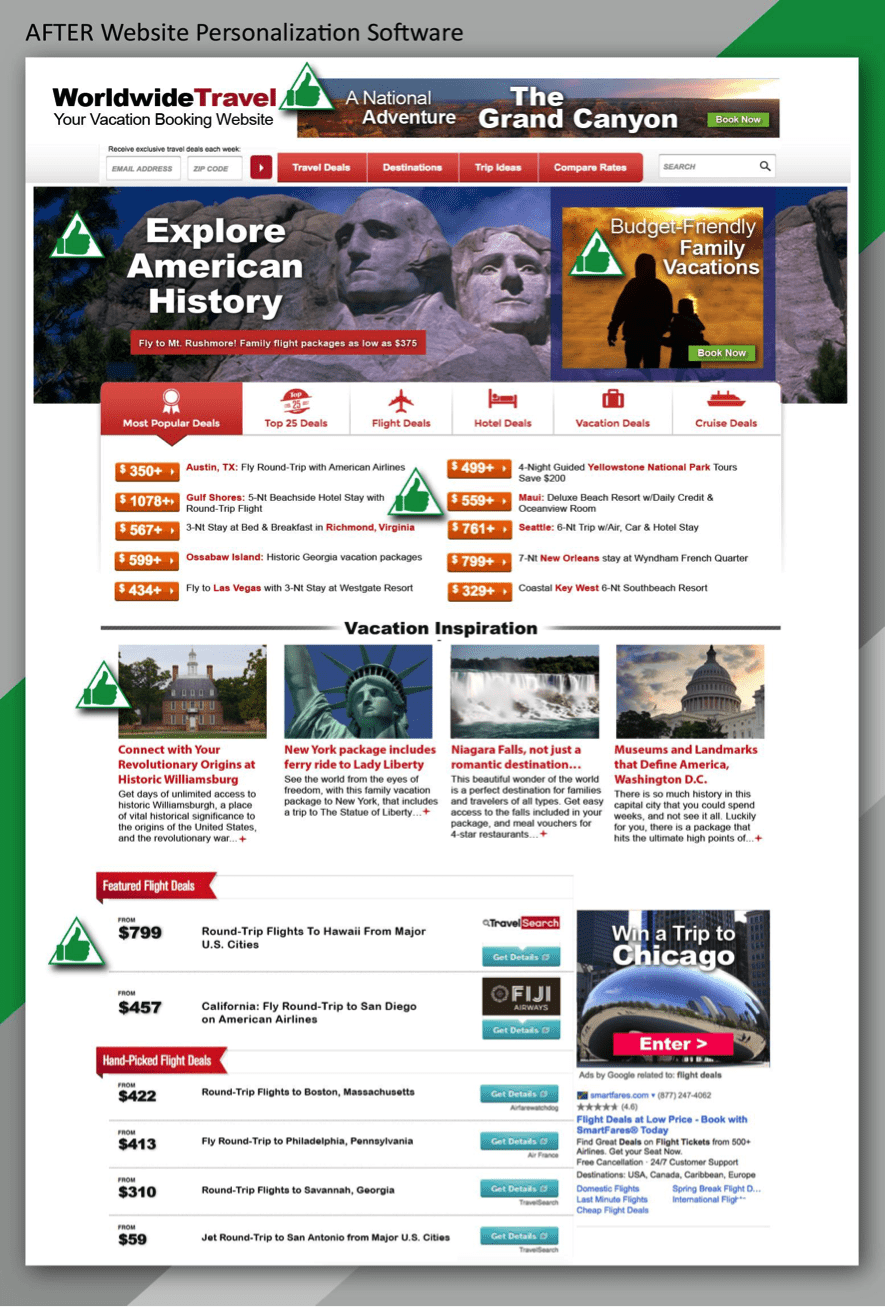
When Fred, ever the bargain shopper, decides to leave the site and shop around a bit first, as soon as his exit intent is detected, a popup appears with a promotional code for 10% off all patriotic destination packages around July 4th, complete with waving flag GIF background. When Fred still decides to shop around, personalized re-marketing emails are sent with the packages that will also link to landing pages which are personalized, to create maximum exposure of all recommendations that are relevant to Fred.
How much more likely do you think Fred is to buy a package through Worldwide Travel after his personalized experience, versus the generic experience without personalization? How much more do you think Fred feels like Worldwide Travel knows him, and is going the extra mile to meet his needs?
Data-Driven Financial Marketing
Your Local Bank is a mid-sized banking chain in the Eastern US, and they are re-visioning their marketing strategy for the new year. Part of their new approach is creating a customer-centric, dynamically personalized website, driven by in-depth customer data. They plan to achieve this using CRM integration, to expand the information they have available about each customer, for enhanced segmentation and personalization.
Pranav is a current customer of YLB, visiting their website. Through CRM data, YLB knows that Pranav:
- Regularly wires money to India
- Is in his early 30s
- Has over 5,000 in checking
- Is a renter who pre-qualified for mortgages
- Bought a car 5 years ago
- Has no known credit card
Without Personalization, Pranav sees the same irrelevant version of YLB’s landing page as everyone else:
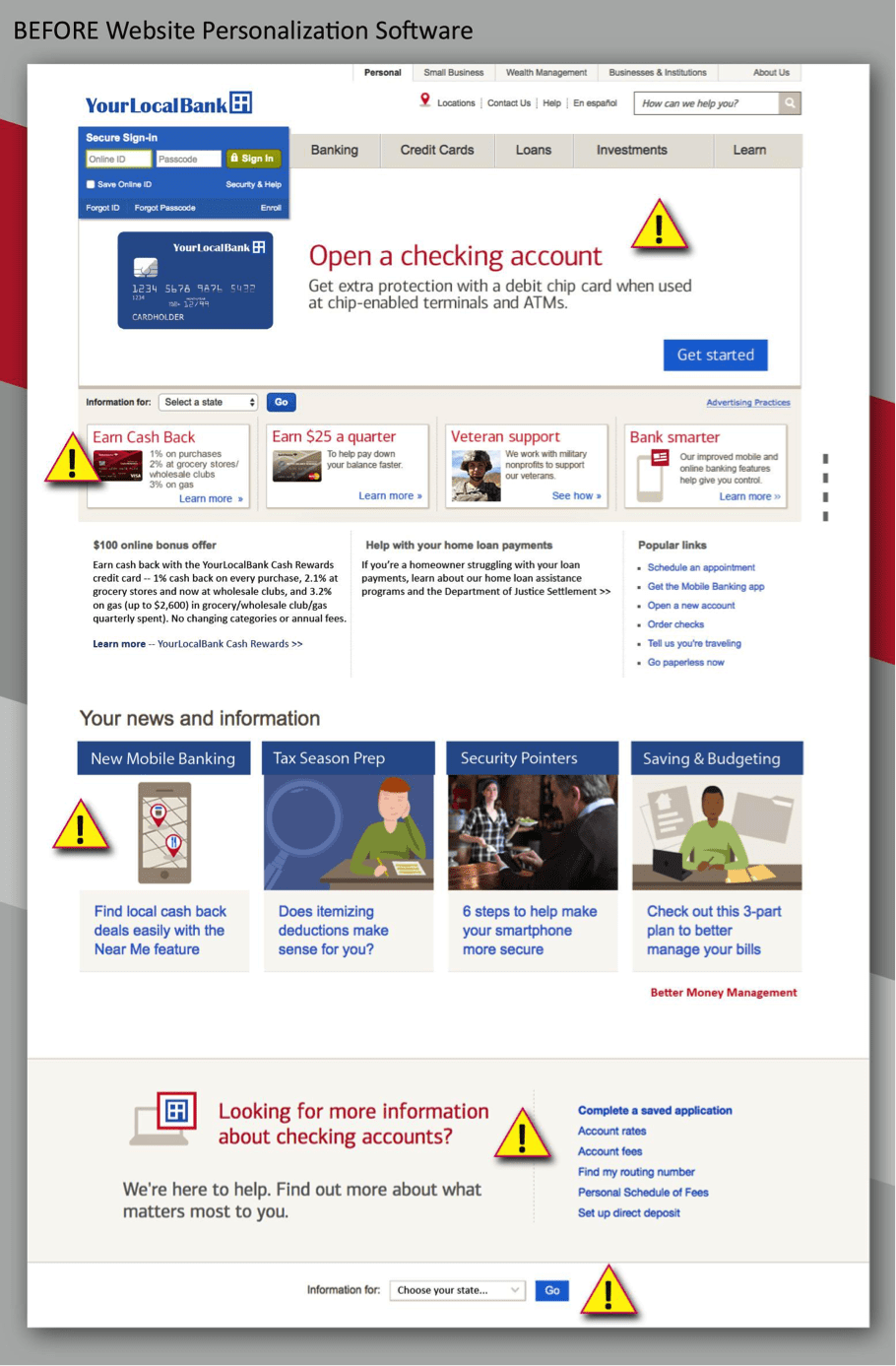
A Whole New Landing Page
By incorporating a variety of personalized promotions on their site using in-depth CRM data, YLB is able to tailor their landing page completely to Pranav.
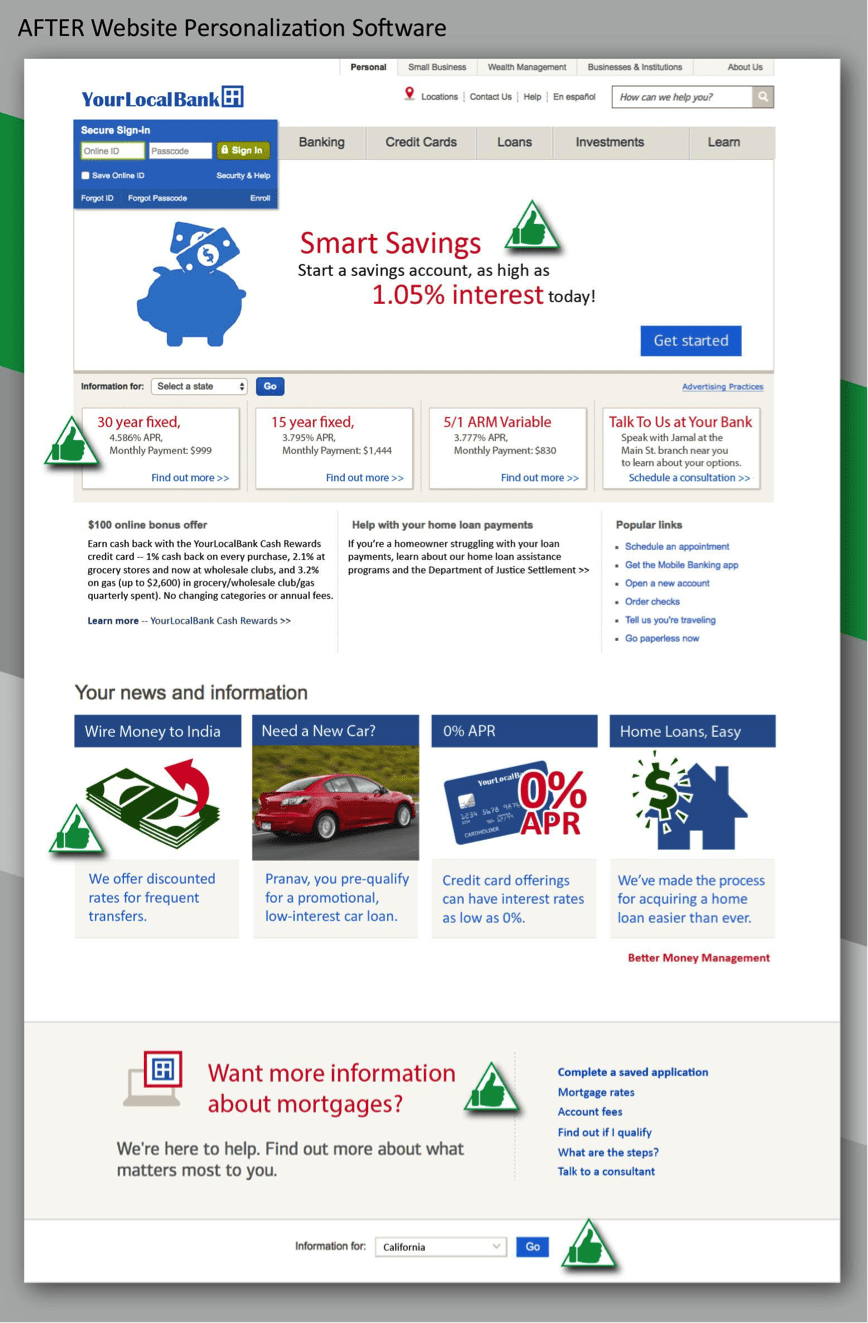
As you can see, every new element of the landing page is relevant to Pranav, in one way or another, which makes him much more likely to explore his other options in regards to mortgages, car loans, new types of account, and perhaps wiring money to India more often.
To go beyond promotions and recommendations, YLB also creates an automated, personalized email marketing campaign, to send relevant emails containing promotional offerings, with different versions of each email for different customer segments such as age groups, marital status, income, etc. They also create a number of dynamically personalized landing pages on their site for different categories of services, to serve as hubs of personalization, to direct the flow of site traffic to what is most relevant for each visitor.
How much more likely do you think Pranav is to upgrade accounts, purchase loans and mortgages, or wire money more often, after personalization? How much faster will YLB reach their ROI goals for their online marketing with personalization in place?
B2B Personalization Success
Strega provides software solutions to a variety of businesses for marketing, sales automation, customer service, accounting, and CRM. Strega has hired a new marketing director, who recognizes the importance of quality personalization. As a B2B solution, in the past, Strega always considered their visitors to be less convenience-driven than typical end-consumers, but recent B2B market research has debunked that idea; having dynamically personalized content can boost sales just as much, regardless of whether your customers are other businesses or end users, particularly when conducting an Account-Based Marketing strategy.
Randy, a visitor to Strega’s site, is:
- Operations Manager, at a utilities company
- Interested in customer service and sales automation
- Existing Customer, shopping from his work IP
- Arrived via search keyword: “customer service automation software”
Before personalization, Randy sees the same generic version of the landing page that everyone else does:
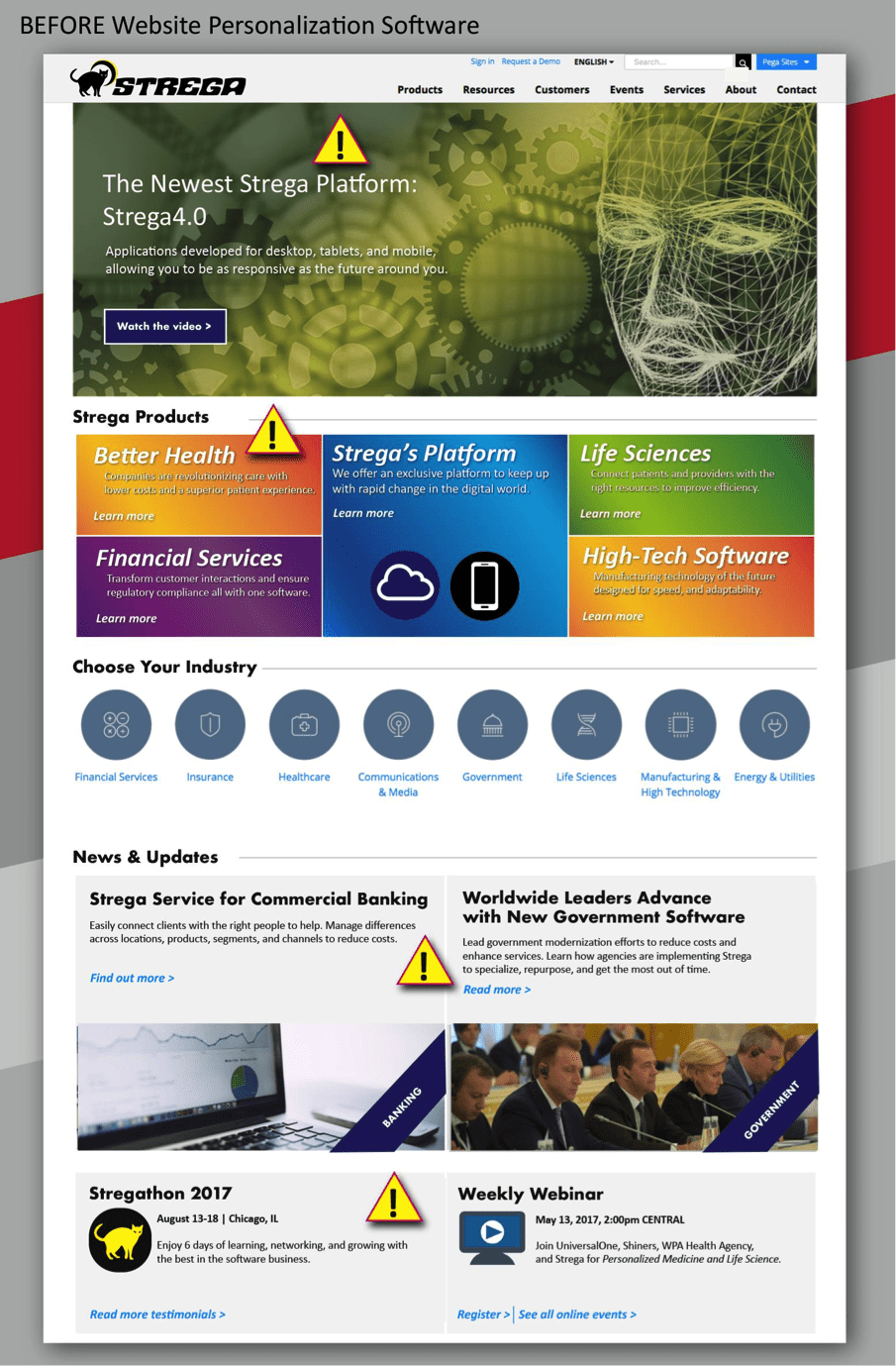
After personalization, using data on his location, industry, previous purchases, search referral keywords, and site interactions, Randy’s experience on Strega is personalized from the moment he lands. Because Strega has embraced an Account-Based Marketing strategy, they are devoting more resources to individual leads such as Randy, and incorporating CRM data for expanded customer knowledge such as role in company, type of industry, position in the sales funnel, and other parameters normally unavailable from default behavioral tracking.
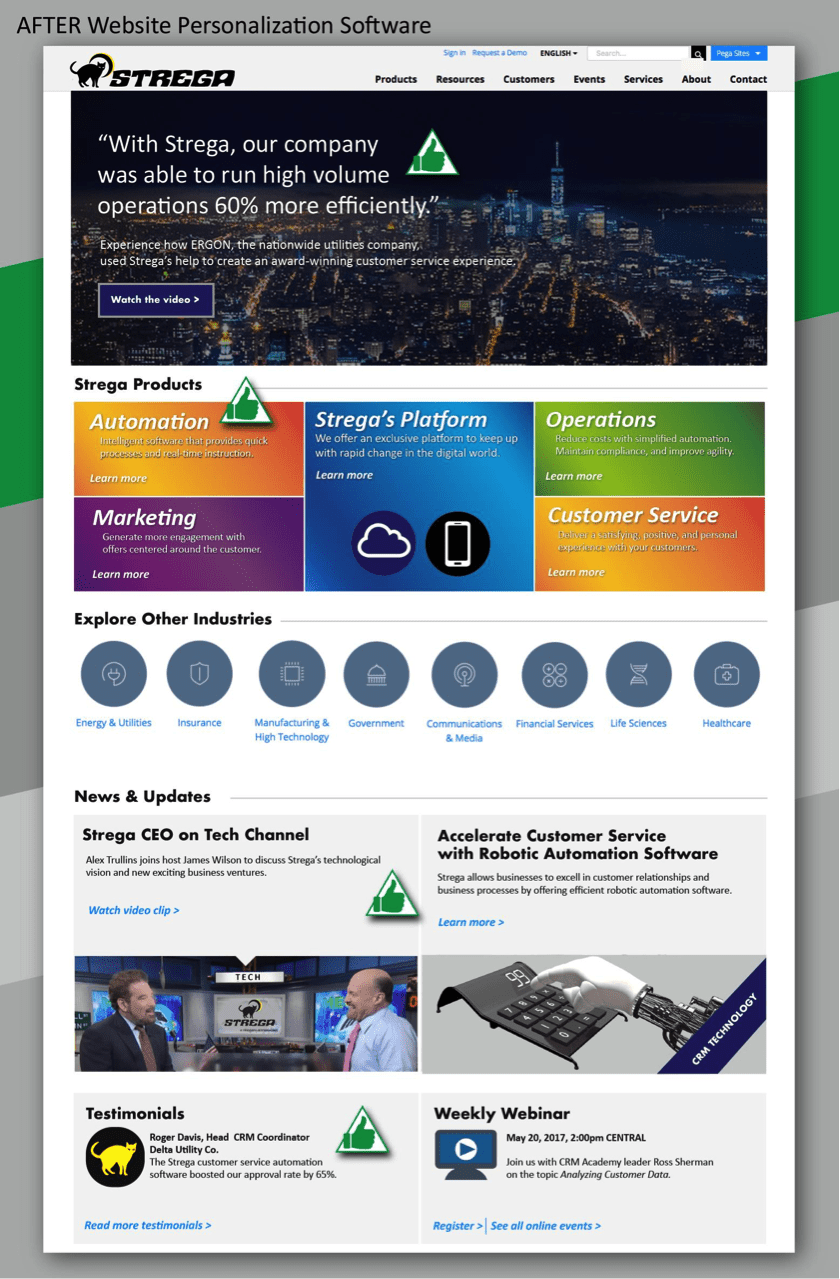
The promotions he sees on the new personalized landing page are all relevant to him, and even include testimonials from professionals in his industry, for the kind of software he’s looking for. As he continues to navigate the site, behavioral tracking also recognizes that he is seeking accounts management software, as well. Randy make an inquiry about a demo using the button at the top of the page, which requires him to insert his name and email.
After he leaves, he will also receive personalized emails that include his name, his company, and which show the various offers and promotions related to his two registered interests, customer service automation and accounts management, in addition to the response about the demo.
If he clicks any one of these offers, he will be directed to landing page for that software, which also includes promotions and recommendations related to it, determined by customer interest algorithms Strega’s marketing team has chosen, as well as add-ons or upgrades to other software he has previously purchased. Since he is a high-end user, his interest is also registered with sales department, who can prioritize his business, and attempt to contact him via phone.
How much more likely do you think Randy is to recommend Strega’s software to a decision-maker, over a competitor whose site knew nothing about his company’s needs, and whose emails weren’t personal at all? How much more is this company going to want to have a working relationship with Strega, versus another company who treated them like a number?

Thanks to Jonathan Riley for sharing advice and opinions in this post. Jonathan is an Account Manager with
Personyze, where he helps online marketers from all types and scales of business provide their sites' visitors with tailored and relevant experiences, using artificial intelligence and dynamic website personalization software. You can connect with him on
LinkedIn.









 Thanks to Jonathan Riley for sharing advice and opinions in this post. Jonathan is an Account Manager with
Thanks to Jonathan Riley for sharing advice and opinions in this post. Jonathan is an Account Manager with 



